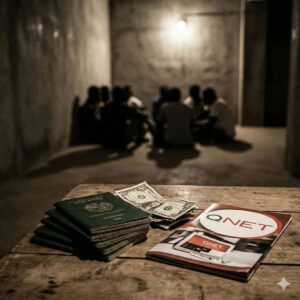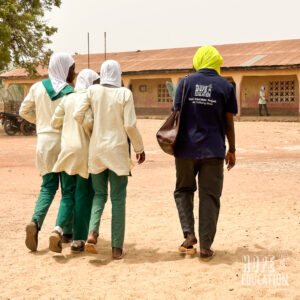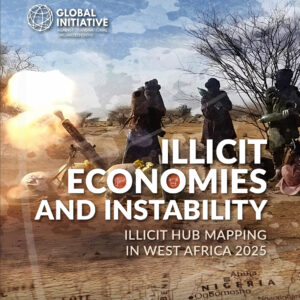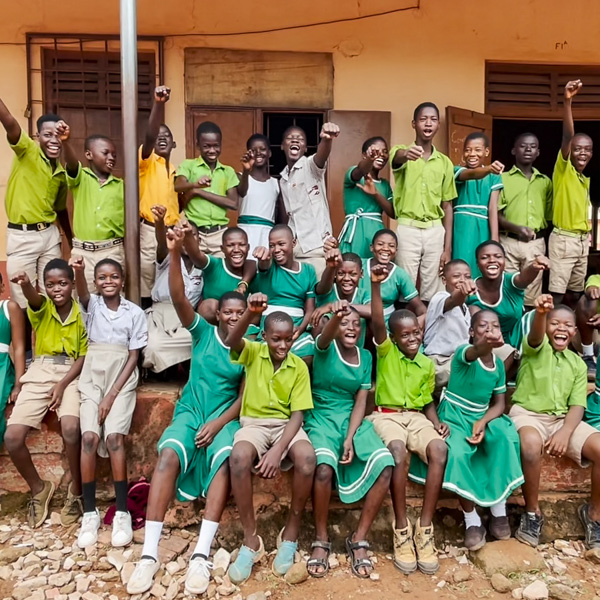Beyond "Sex for Fish": The Male Accountability Crisis in Ghana's Trafficking Networks
Triggered by new research, a disturbing video investigation published this week reveals how male-dominated systems perpetuate child sexual exploitation whilst trafficked girls remain trapped in cycles of re-victimisation.

In the shadow of Cape Coast Castle, where centuries of human trafficking began, a new form of exploitation continues to thrive, enabled by men who remain largely invisible and unaccountable. A recent video documentary investigation by GhanaWeb TV, “Sex for Fish”, has exposed not just the desperate reality of young girls in fishing communities, but the systematic failure to address the men who create and profit from their exploitation.
The Male-Dominated Economy of Exploitation
The fishing industry in Cape Coast’s coastal communities operates as a male-dominated economy where women and girls have virtually no economic power. Men control the boats, the catch, and crucially, the distribution of fish that vulnerable families desperately need for survival. This economic structure creates the perfect conditions for sexual exploitation.
The “Sex for Fish” investigation reveals a clear pattern: fishermen aged 35-40 systematically target girls as young as nine, offering fish in exchange for sex. When they tire of one girl, they simply move to another, leaving behind pregnant teenagers with no support system. Yet these men, the actual perpetrators of trafficking crimes, remain unnamed, uninterviewed, and unprosecuted.
One survivor’s testimony captures this cycle: “The father of my child is a fisherman. He slept with me when I asked for his help… In return, he gave me fish, but later stopped and began giving it to another girl.” The man faces no consequences while moving on to exploit the next vulnerable child.
Recent Research
“Drivers and effects of fish-for-sex related single parenthood in a fishing coastal community in Ghana”: A comprehensive study published in PLOS ONE in June 2025 by Kyei-Gyamfi and Kyei-Arthur examined fish-for-sex related single parenthood in Elmina, finding that 63.1% of fishers acknowledged the occurrence of such arrangements. Their research identified the systematic ways male fishers deny paternity, abandon pregnant partners, and leave women to raise children alone, creating intergenerational cycles where daughters born from these relationships often repeat the same patterns. The study’s findings on male evasion of responsibility and the resulting maternal burden provide crucial academic validation for the accountability crisis outlined in our analysis.
Understanding transactional sex among small scale fisherfolks in Ghana: Parallel research published in March 2025 Marine and Fishery Sciences by Amponsah and colleagues across four Ghanaian fishing communities (Tema, Apam, Axim, and Dixcove) found that 95.9% of respondents acknowledged the existence of sex-for-fish transactions, with poverty (51%) and lack of money (34%) identified as primary drivers. Significantly, their study documented that male perpetrators face virtually no consequences, while effects on victims include death (31%), sexually transmitted diseases (22%), and teenage pregnancy (20%). The research reinforces the gendered power imbalances we’ve highlighted, showing how male-controlled economic systems enable systematic exploitation without accountability.
We will be publishing a detailed analysis of these findings and their implications for anti-trafficking policy in an upcoming piece.
The Absent Male Voice in Solutions
What’s particularly striking about this investigation is the complete absence of male voices calling for change, taking responsibility, or offering solutions. While women advocates, female survivors, and even some male officials discuss the problem, there’s no evidence of:
– Male community leaders condemning the exploitation
– Male fishermen speaking out against their peers’ criminal behaviour
– Fathers and male relatives protecting their daughters and nieces
– Religious and traditional leaders (predominantly male) taking strong action
– Male-led organisations working to change masculine attitudes that enable exploitation
Cape Coast Mayor George Justice Arthur, one of the few men who spoke on record, focused primarily on systemic issues like poverty and education while barely addressing male accountability. Even his proposed solutions, working with police to “grab” the youth at night, target the victims rather than the perpetrators.
Re-Exploitation of Survivors: The Unending Cycle
The investigation reveals that trafficking survivors face a devastating reality: they often become targets for re-exploitation by different men. Teenage mothers, abandoned by the men who initially trafficked them, become even more vulnerable to new forms of abuse.
The cycle works like this:
1. Men exploit girls for sex in exchange for basic necessities
2. Girls become pregnant and are abandoned
3. As single teenage mothers, they become even more desperate and vulnerable
4. New men exploit their increased desperation for further sexual or economic exploitation
5. The original perpetrators face no consequences and move on to exploit new victims
One survivor explained: “Many other young girls in my community also sleep with older men in exchange for fish.” This isn’t individual bad luck, it’s a systematic pattern enabled by men who face no accountability.
The Missing Analysis: Masculinity and Power
The documentary investigation completely fails to examine the masculine culture within fishing communities that normalises the exploitation of vulnerable females. There’s no exploration of:
– How men justify exploiting children and teenagers
– Peer pressure dynamics among male fishermen that perpetuate exploitation
– Traditional masculinity concepts that may contribute to viewing women and girls as commodities
– Economic masculinity where men’s control of resources becomes a tool for sexual exploitation
– Male complicity in maintaining systems that make exploitation possible
Legal Frameworks Without Male Accountability
While experts like Genevieve Partington from Amnesty International correctly identify this as human trafficking under Ghana’s anti-trafficking act, the enforcement gap is glaring. The law exists, but the male perpetrators continue operating with impunity.
“Once there’s sexual exchange, once there’s a transaction based on sex and favours or goods for your livelihood, it is seen as trafficking,” Partington explained. Yet the documentary provides no evidence of any fishermen being arrested, prosecuted, or even questioned by authorities.
Partington also highlighted the gendered nature of this exploitation: “Most of the Fisher folk are men. So you have that gender play where these young women are vulnerable and poor… there’s the poverty situation, lack of education or very little education. So lack of opportunity in that particular community.” This gender imbalance creates the perfect storm for exploitation, yet the investigation fails to examine how male-dominated power structures perpetuate the crisis.
Men as Potential Agents of Change: The Untapped Resource
The tragedy is that men could be the most powerful agents of change in preventing trafficking and supporting survivor rehabilitation, but they remain largely absent from these efforts:
Economic Power: Male fishermen and business owners could create legitimate employment opportunities for vulnerable women and girls instead of exploiting them.
Community Leadership: Traditional and religious male leaders could use their influence to actively condemn exploitation and create protective community norms.
Peer Intervention: Male fishermen could intervene when they witness colleagues exploiting minors, rather than remaining silent or complicit.
Survivor Support: Men could play crucial roles in supporting trafficking survivors by providing legitimate employment, mentorship, and protection from re-exploitation.
Father Figures: Male relatives and community members could serve as protective figures for vulnerable girls rather than potential threats.
Breaking Male Silence: What Needs to Happen
Any serious effort to combat trafficking in these communities must centre on male accountability and engagement:
Immediate Actions:
– Prosecute male perpetrators under existing trafficking laws
– Name and shame men who exploit children in their communities
– Engage male leaders in creating and enforcing protective community standards
– Train male community members to recognise and prevent trafficking
– Create male-led initiatives focused on protecting vulnerable community members
Systemic Changes:
– Economic diversification that reduces women’s dependence on male-controlled fishing economies
– Masculine culture transformation programs that redefine healthy masculinity
– Male accountability groups within fishing communities
– Survivor support programs led by females which safely engage male community members or organisations
The Cost of Male Complicity
The investigation shows what happens when men remain silent, complicit, or absent from anti-trafficking efforts: exploitation continues, survivors face re-victimisation, and entire communities remain trapped in cycles of abuse.
The girls of Intim don’t just need better schools or poverty reduction programs, they need the men in their communities to stop exploiting them and start protecting them. They need male fishermen to become advocates rather than predators. They need male leaders to prioritise child protection over economic convenience.
A Challenge to Men
This crisis cannot be solved without confronting male behaviour, attitudes, and complicity. Men who control economic resources in these communities have a choice: use that power to exploit vulnerable women and girls, or use it to protect and empower them.
The question for every man in these communities is simple: Will you be part of the problem or part of the solution? The girls of Cape Coast’s fishing communities have waited long enough for men to choose protection over exploitation. The time for male accountability is now.
The Hope Education Project calls on men across Ghana to join our efforts to combat human trafficking through education, awareness, and community action. Real change requires male leadership, male accountability, and male commitment to protecting rather than exploiting vulnerable community members.

QNet in Ghana: BBC Investigation, EOCO Raids, and Avoiding the Scam

Hope Education Project UK Is now a registered charity


Child-Centred Prevention and Filling the Data Gaps in Ghana




